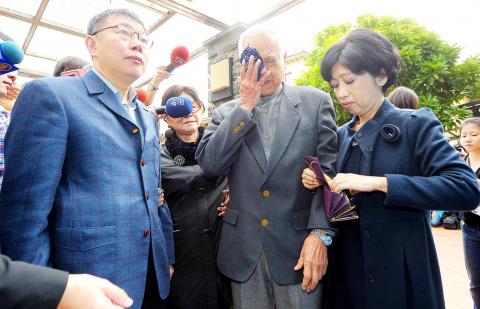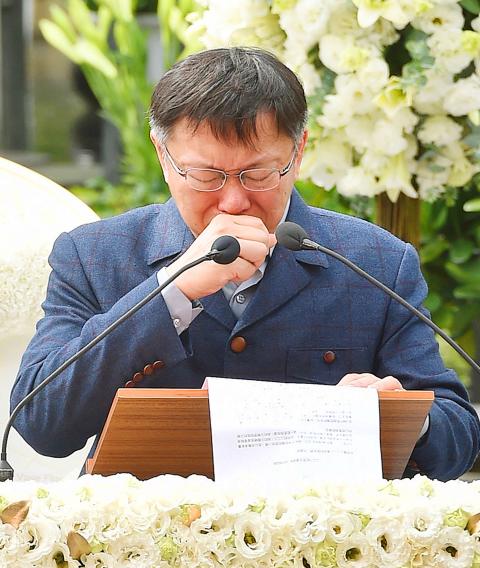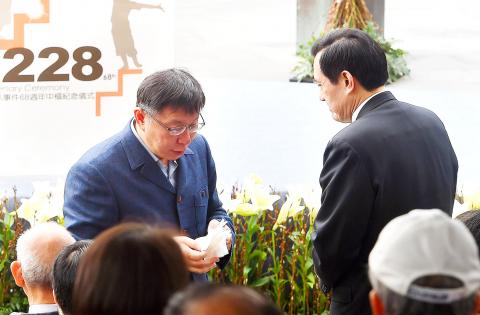The painful history of the 228 Incident — and the torment and grief that families of its victims still feel — were brought into sharp focus yesterday by Taipei Mayor Ko Wen-je (柯文哲) when he delivered an emotional speech at the government’s memorial ceremony, after which it appeared that he refused to shake hands with President Ma Ying-jeou (馬英九).
During his address at the 228 Memorial Park in Taipei yesterday, Ko choked up several times when talking about his grandfather, Ko Shih-yuan (柯世元), who survived the 228 Incident in 1947, but died three years later of the injuries he reportedly suffered after torture and beatings by Chinese Nationalist Party (KMT) troops.
Ko Wen-je’s father, Ko Cheng-fa (柯承發), also attended the event.

Photo provided by Taipei Photojournalists Association
It was the mayor’s first time addressing a national audience at a 228 memorial since taking office.
Ma, Premier Mao Chih-kuo (毛治國) and other KMT government officials were also in attendance.
Ko is the first Taipei mayor whose family suffered directly in the 228 Massacre, and he was invited to represent victims’ families.

Photo: Liao Chen-hui, Taipei Times
Observers said that his taking the central stage at the memorial was an important occasion, charged with political symbolism and historic meaning for Taiwanese.
“Just how painful was the aftermath of the 228 Incident? It is suffering that went beyond words. My father never wanted to talk about what happened to his father. He did not want our generation to bear the suffering of the older generation,” Ko Wen-je said.
“We must have the truth; then we may forgive. Only then can we have reconciliation and peace,” he added. “We must not allow such a tragedy to happen to our children and our grandchildren. This is the responsibility of our generation. Only when there is justice in government can we have harmony in society — and have a future for our nation.”

Photo: Liao Chen-huei, Taipei Times
“Not knowing much about my grandfather, I learned about him from history and from old photographs. I got to know about my grandfather only by the tears my father shed at each year’s 228 commemoration services,” he said.
“During that sorrowful and grieving time of 1947, many Taiwanese lost their families, relatives and friends,” he said. “Society also lost many intellectuals and its elite. It also left a legacy of fear and terror in Taiwan’s history, which resulted in silence and divisions between people, creating an invisible, cold-hearted wall that still divides society today.”
Ko Wen-je frequently wiped away tears.
After his speech, he twice appeared to decline shaking hands with Ma.
As Ma first offered a handshake, Ko waved his hand in a gesture of refusal after leaving the podium. At the end of the ceremony, Ma shook hands with family members of victims and again offered his hand to Ko, who apparently refused again.
Ko Wen-je’s mother, Ho Jui-ying (何瑞英), dismissed speculation over her son’s behavior when reporters sought comment later in the afternoon about the episode, which triggered a flurry of media reports.
It would have been rude for Ko to shake hands with the president, because her son was holding a soiled tissue, Ho said.
“He could not just throw the tissue on the ground out there. With the tissue in his hand, he was unable to shake President Ma’s hand,” she said.
During yesterday’s event, several groups organized separate protests against Ma and the KMT outside the ceremony venue.
Protest organizers and participants including the Taiwanese National Party, the Organization for Taiwanese National Declaration and the Taijimen group, which led to brief confrontations with police officers deployed to provide security.
Additional reporting by Shih Hsiu-chuan

Conflict with Taiwan could leave China with “massive economic disruption, catastrophic military losses, significant social unrest, and devastating sanctions,” a US think tank said in a report released on Monday. The German Marshall Fund released a report titled If China Attacks Taiwan: The Consequences for China of “Minor Conflict” and “Major War” Scenarios. The report details the “massive” economic, military, social and international costs to China in the event of a minor conflict or major war with Taiwan, estimating that the Chinese People’s Liberation Army (PLA) could sustain losses of more than half of its active-duty ground forces, including 100,000 troops. Understanding Chinese

The Ministry of Foreign Affairs (MOFA) yesterday said it is closely monitoring developments in Venezuela, and would continue to cooperate with democratic allies and work together for regional and global security, stability, and prosperity. The remarks came after the US on Saturday launched a series of airstrikes in Venezuela and kidnapped Venezuelan President Nicolas Maduro, who was later flown to New York along with his wife. The pair face US charges related to drug trafficking and alleged cooperation with gangs designated as terrorist organizations. Maduro has denied the allegations. The ministry said that it is closely monitoring the political and economic situation

UNRELENTING: China attempted cyberattacks on Taiwan’s critical infrastructure 2.63 million times per day last year, up from 1.23 million in 2023, the NSB said China’s cyberarmy has long engaged in cyberattacks against Taiwan’s critical infrastructure, employing diverse and evolving tactics, the National Security Bureau (NSB) said yesterday, adding that cyberattacks on critical energy infrastructure last year increased 10-fold compared with the previous year. The NSB yesterday released a report titled Analysis on China’s Cyber Threats to Taiwan’s Critical Infrastructure in 2025, outlining the number of cyberattacks, major tactics and hacker groups. Taiwan’s national intelligence community identified a large number of cybersecurity incidents last year, the bureau said in a statement. China’s cyberarmy last year launched an average of 2.63 million intrusion attempts per day targeting Taiwan’s critical

‘SLICING METHOD’: In the event of a blockade, the China Coast Guard would intercept Taiwanese ships while its navy would seek to deter foreign intervention China’s military drills around Taiwan this week signaled potential strategies to cut the nation off from energy supplies and foreign military assistance, a US think tank report said. The Chinese People’s Liberation Army (PLA) conducted what it called “Justice Mission 2025” exercises from Monday to Tuesday in five maritime zones and airspace around Taiwan, calling them a warning to “Taiwanese independence” forces. In a report released on Wednesday, the Institute for the Study of War said the exercises effectively simulated blocking shipping routes to major port cities, including Kaohsiung, Keelung and Hualien. Taiwan would be highly vulnerable under such a blockade, because it